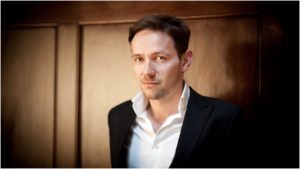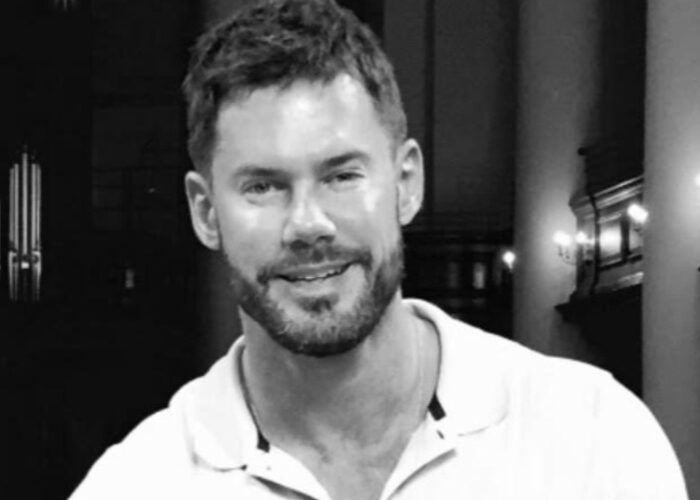
Working With Kings – Countertenor Iestyn Davies on ‘Farinelli and the King’ & Working With Thomas Adès
By David SalazarIt all started with a phone call.
Countertenor Iestyn Davies was just going about his usual business when Claire van Kampen called him up to make an offer.
She had been preparing “Farinelli and the King” when she heard a voice on the radio. A countertenor to be sure. The singer in question? Davies. She knew that she had to contact him to be on the show.
“It’s about a singer who goes to help a person that is suffering from a form of madness. It shows the power of music to restore,” Davies told OperaWire in an interview relating his upcoming participation on “Farinelli and the King” as it makes its Broadway debut. “So she wanted a voice convincing onstage that people might help someone out of their madness.”
But Davies wasn’t ready to go for it. He had his reasons. “Farinelli was more of a soprano castrato. My voice doesn’t go quite as high as his did.” He also had a massively busy schedule and career to manage. A career that has seen him perform with such companies as the Zurich Opera, the English National Opera, the Welsh National Opera, the Royal Opera House, Covent Garden, the Metropolitan Opera, the London Philharmonic Orchestra, the English Concert, the Hallé Orchestra, the Academy of Ancient Music, and many others.
But that wasn’t good enough an excuse for van Kampen, who insisted until the countertenor gave in.
“She insisted that it wasn’t historical. It was about two men and what matters is the healing and music therapy.”
Creating Farinelli
At that point, he couldn’t help but accept. But he knew that a lot of work had to be done to make his involvement credible.
First off, he would only be singing in the production, not actually acting the full role of Farinelli. So his singing would need to have an impact and be tailored to suit his vocal comfort. And since his voice alone would break with historical accuracy, his selection of repertoire did as well.
“My argument is if you were asked to sing for royalty, you don’t just sing your stuff,” Davies explained. “You sing the best stuff there is. He would have sung some of the best arias ever written, of which some were likely those of Handel.”
He went on to add that adding Handel arias were not out of the realm of possibility since the famed countertenor knew about the prestigious baroque composer. And so he included some of Handel’s greatest hits in the work, knowing that it would be a great fit for the audiences.
In sum, the countertenor noted that he sings between 20-25 minutes throughout the entire show, but was adamant that it was “not a breeze. You have to warm up to be able to sing at that level.”
He noted that another major challenge of the production was that he had to share the role with someone else. For an opera singer used to appearing onstage and inhabiting a character while singing, having to be onstage and have another character acting out his person was not that simple. And he added that it could be a tad bit confusing to the audience.
“One man came to see me sing and he was upset because he said it sounded like me but it wasn’t me,” Davies narrated. “He thought it was the actor that sang.”
The other major challenge for Davies is the schedule. When doing opera, he usually gets a break between shows. With theater, he has to go at it almost every day with only one day off to unwind.
“I did all eight performances in London during the initial run in 2015, but I’m not singing all of them in New York,” he stated. “But I still have to be monk-like in my existence. Go home after a show and be absolutely healthy.”
The premiere of the production at the West End in London took place in 2015 and comes to Broadway with tremendous prestige, getting nominated for such 2016 Olivier Awards as Best New Play, Best Actor in a Play, Best Actress in a Supporting Role, Best Set Design, Best Costume Design, and of course, Outstanding Achievement in Music, for which Davies was among the nominees.
Now Davies is excited to see how New York audiences react to the production.
“They’re very sophisticated and have high expectations,” he noted.
Working With Another Giant
Of course, the countertenor knows all about New York audiences, having come off another massive career challenge, “The Exterminating Angel” at the Metropolitan Opera.
He had already performed the difficult Thomas Adès opera during its first two runs in Salzburg and London, but he knew that the Met would be a bigger challenge. Mainly because the theater is massive compared to the other two venues that came before it.
“The orchestra felt bigger and bolder at the Met,” he noted before adding that the audience engagement was quite different this time around. “There has been more laughter from the audience this time. It’s been quite surprising and fascinating.”
While it was the third time he’d taken on “The Exterminating Angel,” the countertenor was quick to note that it was still one of the “hardest things I’ve done. It’s so hard to put together. Nobody out sings anyone. Everyone is equal. It’s very much an ensemble in terms of commitment. We had to spend six weeks in Salzburg to figure out how it would go. I don’t envy the director for putting that together.”
In the case of the Met, Davies noted that new cast members had to be accommodated, altering the dynamics of a show that is full of them.
“It’s such an engaging thing when you’re in it. You don’t go offstage like a Handel opera after an aria. You basically stay in character the entire time.”
As is the case with “Farinelli,” where he gets to work hand in hand with the show’s creator, “The Exterminating Angel” offered Davies the opportunity to collaborate with composer Adès, who he considers a close friend.
“I’ve known him since I was 24 and I feel that I can talk to him about anything,” he noted. “What’s most fascinating is that he challenges his singers. You can go up to him and tell him that what he wrote was really hard, and he’ll turn to you and tell you that you can do it. So it’s great to work with a composer that writes things for you and also really believes in your abilities. And he’s very firm. Some composers will be more amenable, but he just wants you to step up.
“It makes me realize how lucky we are. I can’t exactly talk to Mozart or Handel. People just assume what the composer might have intended. But here the composer takes away the air of mystery and simplifies everything.”


